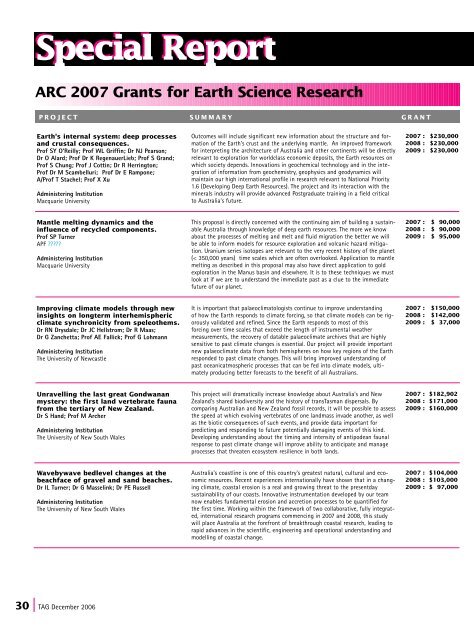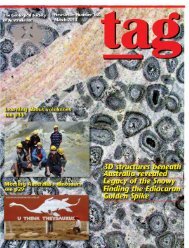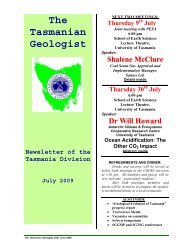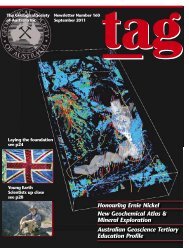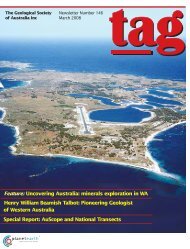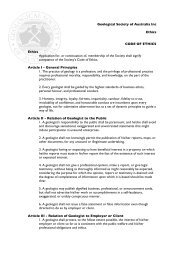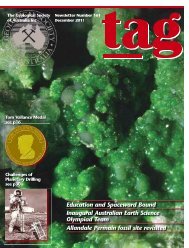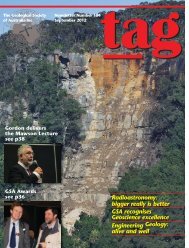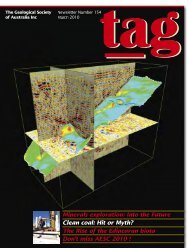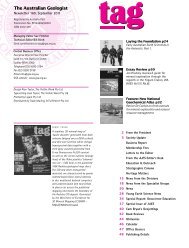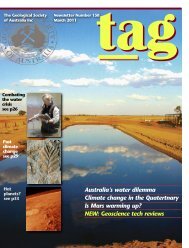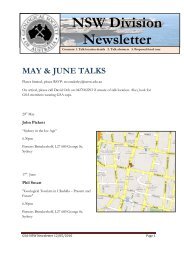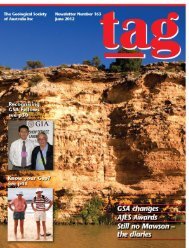The Australian Geologist - Geological Society of Australia
The Australian Geologist - Geological Society of Australia
The Australian Geologist - Geological Society of Australia
You also want an ePaper? Increase the reach of your titles
YUMPU automatically turns print PDFs into web optimized ePapers that Google loves.
Special Report<br />
Special Report<br />
ARC 2007 Grants for Earth Science Research<br />
PROJECT SUMMARY GRANT<br />
Earth's internal system: deep processes<br />
and crustal consequences.<br />
Pr<strong>of</strong> SY O'Reilly; Pr<strong>of</strong> WL Griffin; Dr NJ Pearson;<br />
Dr O Alard; Pr<strong>of</strong> Dr K RegenauerLieb; Pr<strong>of</strong> S Grand;<br />
Pr<strong>of</strong> S Chung; Pr<strong>of</strong> J Cottin; Dr R Herrington;<br />
Pr<strong>of</strong> Dr M Scambelluri; Pr<strong>of</strong> Dr E Rampone;<br />
A/Pr<strong>of</strong> T Stachel; Pr<strong>of</strong> X Xu<br />
Administering Institution<br />
Macquarie University<br />
Outcomes will include significant new information about the structure and formation<br />
<strong>of</strong> the Earth's crust and the underlying mantle. An improved framework<br />
for interpreting the architecture <strong>of</strong> <strong>Australia</strong> and other continents will be directly<br />
relevant to exploration for worldclass economic deposits, the Earth resources on<br />
which society depends. Innovations in geochemical technology and in the integration<br />
<strong>of</strong> information from geochemistry, geophysics and geodynamics will<br />
maintain our high international pr<strong>of</strong>ile in research relevant to National Priority<br />
1.6 (Developing Deep Earth Resources). <strong>The</strong> project and its interaction with the<br />
minerals industry will provide advanced Postgraduate training in a field critical<br />
to <strong>Australia</strong>'s future.<br />
2007 : $230,000<br />
2008 : $230,000<br />
2009 : $230,000<br />
Mantle melting dynamics and the<br />
influence <strong>of</strong> recycled components.<br />
Pr<strong>of</strong> SP Turner<br />
APF <br />
Administering Institution<br />
Macquarie University<br />
This proposal is directly concerned with the continuing aim <strong>of</strong> building a sustainable<br />
<strong>Australia</strong> through knowledge <strong>of</strong> deep earth resources. <strong>The</strong> more we know<br />
about the processes <strong>of</strong> melting and melt and fluid migration the better we will<br />
be able to inform models for resource exploration and volcanic hazard mitigation.<br />
Uranium series isotopes are relevant to the very recent history <strong>of</strong> the planet<br />
(< 350,000 years) time scales which are <strong>of</strong>ten overlooked. Application to mantle<br />
melting as described in this proposal may also have direct application to gold<br />
exploration in the Manus basin and elsewhere. It is to these techniques we must<br />
look at if we are to understand the immediate past as a clue to the immediate<br />
future <strong>of</strong> our planet.<br />
2007 : $ 90,000<br />
2008 : $ 90,000<br />
2009 : $ 95,000<br />
Improving climate models through new<br />
insights on longterm interhemispheric<br />
climate synchronicity from speleothems.<br />
Dr RN Drysdale; Dr JC Hellstrom; Dr R Maas;<br />
Dr G Zanchetta; Pr<strong>of</strong> AE Fallick; Pr<strong>of</strong> G Lohmann<br />
Administering Institution<br />
<strong>The</strong> University <strong>of</strong> Newcastle<br />
It is important that palaeoclimatologists continue to improve understanding<br />
<strong>of</strong> how the Earth responds to climate forcing, so that climate models can be rigorously<br />
validated and refined. Since the Earth responds to most <strong>of</strong> this<br />
forcing over time scales that exceed the length <strong>of</strong> instrumental weather<br />
measurements, the recovery <strong>of</strong> datable palaeoclimate archives that are highly<br />
sensitive to past climate changes is essential. Our project will provide important<br />
new palaeoclimate data from both hemispheres on how key regions <strong>of</strong> the Earth<br />
responded to past climate changes. This will bring improved understanding <strong>of</strong><br />
past oceanicatmospheric processes that can be fed into climate models, ultimately<br />
producing better forecasts to the benefit <strong>of</strong> all <strong><strong>Australia</strong>n</strong>s.<br />
2007 : $150,000<br />
2008 : $142,000<br />
2009 : $ 37,000<br />
Unravelling the last great Gondwanan<br />
mystery: the first land vertebrate fauna<br />
from the tertiary <strong>of</strong> New Zealand.<br />
Dr S Hand; Pr<strong>of</strong> M Archer<br />
Administering Institution<br />
<strong>The</strong> University <strong>of</strong> New South Wales<br />
This project will dramatically increase knowledge about <strong>Australia</strong>'s and New<br />
Zealand's shared biodiversity and the history <strong>of</strong> transTasman dispersals. By<br />
comparing <strong><strong>Australia</strong>n</strong> and New Zealand fossil records, it will be possible to assess<br />
the speed at which evolving vertebrates <strong>of</strong> one landmass invade another, as well<br />
as the biotic consequences <strong>of</strong> such events, and provide data important for<br />
predicting and responding to future potentially damaging events <strong>of</strong> this kind.<br />
Developing understanding about the timing and intensity <strong>of</strong> antipodean faunal<br />
response to past climate change will improve ability to anticipate and manage<br />
processes that threaten ecosystem resilience in both lands.<br />
2007 : $182,902<br />
2008 : $171,000<br />
2009 : $160,000<br />
Wavebywave bedlevel changes at the<br />
beachface <strong>of</strong> gravel and sand beaches.<br />
Dr IL Turner; Dr G Masselink; Dr PE Russell<br />
Administering Institution<br />
<strong>The</strong> University <strong>of</strong> New South Wales<br />
<strong>Australia</strong>'s coastline is one <strong>of</strong> this country's greatest natural, cultural and economic<br />
resources. Recent experiences internationally have shown that in a changing<br />
climate, coastal erosion is a real and growing threat to the presentday<br />
sustainability <strong>of</strong> our coasts. Innovative instrumentation developed by our team<br />
now enables fundamental erosion and accretion processes to be quantified for<br />
the first time. Working within the framework <strong>of</strong> two collaborative, fully integrated,<br />
international research programs commencing in 2007 and 2008, this study<br />
will place <strong>Australia</strong> at the forefront <strong>of</strong> breakthrough coastal research, leading to<br />
rapid advances in the scientific, engineering and operational understanding and<br />
modelling <strong>of</strong> coastal change.<br />
2007 : $104,000<br />
2008 : $103,000<br />
2009 : $ 97,000<br />
30 | TAG December 2006


